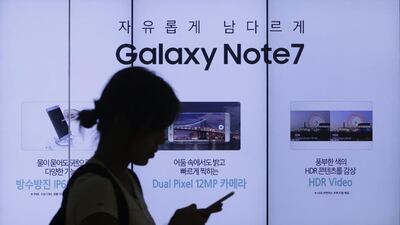There's an internet meme depicting a cartoon dog in a burning house that is often used on social media to highlight news events that combine unfolding tragedy with wilful ignorance. Oblivious to his rapidly crumbling surroundings, the dog defiantly says with a straight face: "This is fine".
The cartoon has been used to summarise everything from the continuing farce that is the US election to this summer's Brexit vote, but it also applies to the mess Samsung finds itself in with its exploding Galaxy Note 7.
The South Korean company on Tuesday officially killed the smartphone by ending production, but only after a few days of pretending - at least outwardly - that nothing was wrong. That followed a massive recall last month prompted by dozens of reported battery meltdowns. It turns out the replacements were just as faulty as the originals.
Now it is not just the metaphorical house that's on fire, but Samsung's reputation - a situation that will have wide-scale if not global repercussions for the company.
The actual cost of the debacle to Samsung is expected to be huge. Analysts figured the original recall would cost between US$1 billion and $2bn, but a worst-case scenario now estimates a hit of $5bn to operating profit through next year.
Shares of Samsung Electronics have nosedived as a result, falling 8 per cent in Seoul on Tuesday, wiping $17bn off its market value. Yesterday the bleeding slowed and they lost 0.6 per cent.
The cost to the company's image may be greater.
__________
Revision
¦ Read the CNBC report: Samsung cuts $2.3 billion off its profit guidance due to Galaxy Note 7 crisis
__________
For weeks, airlines around the world have effectively been airing anti-Samsung ads with preflight announcements, urging passengers to turn off their Note 7 devices. Electronics stores, meanwhile, have been posting signs reminding every customer who passes through that Samsung's latest phone is defective.
Adding fuel to the, er, fire is a recent bulletin from the US Consumer Product Safety Commission warning consumers about the company's washing machines. Certain models can blow apart if overloaded, the agency says.
"Samsung needs to make sure that the perception consumers have remains on 'there is something wrong with the Note 7' and does not become 'there is something wrong with Samsung'," the industry analyst Carolina Milanesi told the technology website ReCode. "The messier this whole thing gets, the more consumers will start to question Samsung."
Unfortunately, as the company's fortunes go, so too do those of South Korea. The mega-conglomerate, which offers everything from credit cards to construction in its homeland, accounts for a fifth of the country's GDP and employs about 100,000 people domestically. Many South Koreans suitably refer to their nation as "the Republic of Samsung".
Despite the local diversification, most of the larger Samsung Group's business comes from its global electronics division. Samsung Electronics makes up about half its overall revenue, and about half of that comes from the mobile segment.
A major downturn in Samsung's smartphone business will inevitably result in lost jobs and a hit to the South Korean economy. And all because someone did not insist on proper quality control.
Despite the fiasco, Samsung does have a reputation as a provider of high-quality, premium electronics, but that is a relatively recent phenomenon. Japanese companies had that distinction for much of the late 20th century, but Sony, Panasonic and Sharp became bloated and vulnerable to disruption from smaller, nimbler competitors.
South Korea's Samsung and LG were able to roll out products more quickly and sell them at lower cost. The results were predictable. Today, the two are global leaders in many electronics categories, from phones to microwave ovens, while their Japanese rivals are either also-rans or getting out of the businesses entirely.
History has a way of repeating and it is now newer, nimbler Chinese companies that are threatening the South Korean giants. Companies including Huawei, ZTE and Lenovo are on the rise with products that cost less and are quickly improving in quality.
Indeed, the Chinese government is bent on bettering the country's reputation on that front. New manufacturing guidelines instituted this summer aim to make Chinese goods globally competitive quality-wise by 2020.
There is no good time for a product fiasco, but this is a particularly bad one for Samsung. Not only is the Note 7 disaster creating opportunities for rivals such as Apple and LG, it is also opening the door for an entirely new class of competitor.
For Samsung, the country that depends on it for so much and the larger world electronics order, this is not fine.
Winner of the Week: Netflix. The streaming giant's competitors look to be dropping like flies. Canada's Shomi has announced it will fold at the end of next month, as will Australia's Presto, by January. It's increasingly looking like no one will be able to touch Netflix.
Loser of the Week: Twitter. Shares in the social media company benefited recently from rumours that Google, Disney and Salesforce were interested in buying it. But with all of the suitors reportedly backing off, the stock price has plummeted by about a third since Thursday, below what it was before the rumours surfaced.
Peter Nowak is a veteran technology writer and the author of Humans 3.0: The Upgrading of the Species.
* The National and CNBC are global content sharing partners.
business@thenational.ae
Follow The National's Business section on Twitter

Peter Nowak: Samsung Galaxy Note 7 fiasco will have global repercussions
The phone's defects have hurt the reputation of a company that makes up about one-fifth of its home country's GDP, and there is a danger that public opinion could go from 'there is something wrong with this particular phone' to 'there is something wrong with Samsung'.
Most popular today
